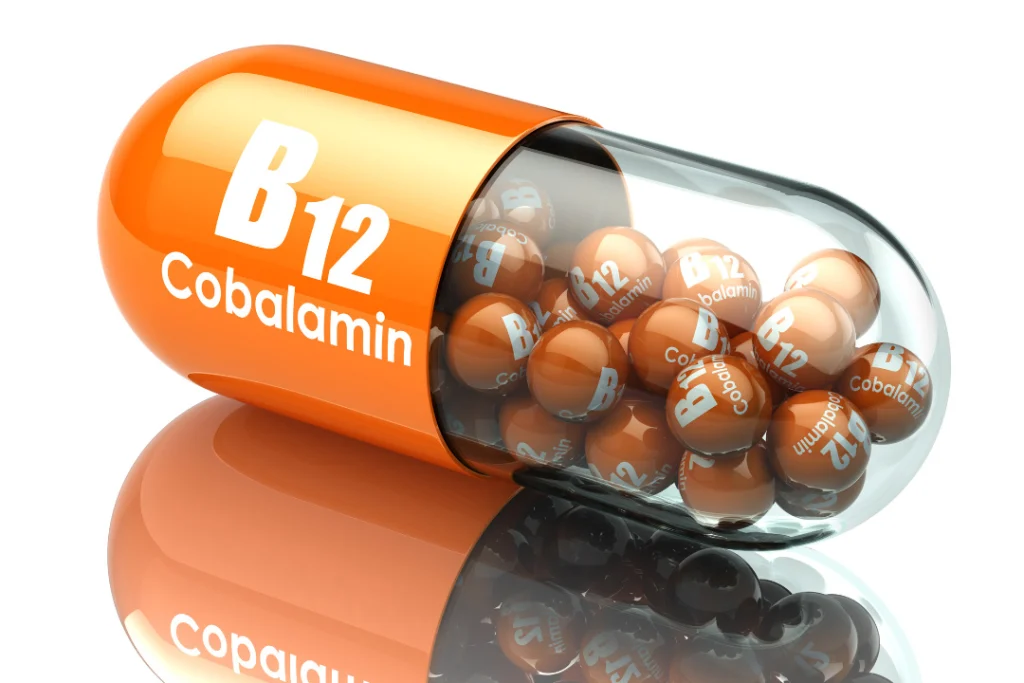Pantothenic acid, or commonly known as vitamin B5, is a water-soluble nutrient that is necessary for several physiological functions which includes energy metabolism, hormone synthesis, and the production of neurotransmitters. For the maintenance of cognitive function and brain health, vitamin B5 intake is essential. By examining vitamin B5’s chemical features, health advantages, recommended dosage, adverse effects, possible drug interactions, and best responsible use, a thorough assessment of vitamin B5 can be provided for people who are looking to improve focus and cognition. This article also presents myPEAK Radiance, a supplement sold by myPEAK Supplements, as a trustworthy source of vitamin B5 in a synergistic and highly bioavailable formulation.
Vitamin B5: Benefits, Dosage, Side Effects, Drug Interactions, And Other Important Information is an original (BetterNurtitionNews) article.
Nature of Vitamin B5
Vitamin B5 can be found in a variety of foods which includes whole grains, legumes, vegetables, meat, chicken, and fish. The name “pantothenic” comes from the Greek word “pantothen,” which means “from everywhere,” indicating its pervasiveness in the natural world. Coenzyme A (CoA) and an acyl carrier protein (ACP), both of which are crucial for energy metabolism and the synthesis of vital biomolecules, are produced in the body as a result of vitamin B5 conversion.
Health Benefits of Vitamin B5
Vitamin B5 has a significant impact on cognitive function and is engaged in a variety of physiological processes that contribute to its many health advantages. Among the main advantages of vitamin B5 are:
1. Cognitive function: Acetylcholine, a neurotransmitter important for memory, learning, and general cognitive function, is synthesized with the help of vitamin B5. A sufficient vitamin B5 consumption boosts acetylcholine synthesis and aids in maintaining peak cognitive function.
2. Energy metabolism: Vitamin B5 is essential for energy metabolism because it is a precursor to coenzyme A (CoA), which aids in the use of carbs, lipids, and proteins for energy production. This procedure aids in making sure that the brain receives enough fuel for maximum performance.
3. Synthesis of hormones: Vitamin B5 is necessary for the production of steroid hormones like cortisol, which helps control how the body reacts to stress. A good stress response can ultimately improve concentration and improve general cognitive function.
4. Antioxidant support: Vitamin B5 protects cells from oxidative damage and promotes overall brain health thanks to its antioxidant capabilities.
Chemistry and Physiological Mechanism of Action of Vitamin B5
Vitamin B5 exists in its active state as a CoA ACP, both of which are essential for a variety of metabolic processes in the body and brain. Many critical components of vitamin B5’s diverse physiological mechanism of action are important for maintaining healthy cognition and the brain which include:
1. Acetylcholine synthesis: Acetylcholine is a neurotransmitter that play a role in memory, learning, and general cognitive function. Vitamin B5 is important for its synthesis. The formation of acetyl-CoA which leads to the synthesis of acetylcholine depends on coenzyme A. As mentioned, vitamin B5 exist in its active form which is CoA. Vitamin B5 aids in maintaining healthy brain function by promoting acetylcholine synthesis.
2. Energy metabolism: Vitamin B5, which is a part of the coenzyme A, is crucial for the breakdown and utilization of carbs, lipids, and proteins for the generation of energy. The brain depends largely on a continual supply of energy for its many functions, thus enough energy production is necessary for it to operate at its best.
3. Hormone synthesis and regulation: Vitamin B5 is essential for the production and control of many hormones, including cortisol, which helps control how the body reacts to stress. In order to sustain concentration and general cognitive function, a stress response that is well-controlled is necessary.
4. Protection from oxdative damage: Vitamin B5 contains antioxidant qualities that help to shield cells from oxidative damage and promote overall brain function.
Vitamin B5 has a variety of physiological and chemical effects on cognition and brain health, including its participation in acetylcholine synthesis, energy metabolism, hormone synthesis and regulation, and antioxidant support. The significance of maintaining adequate vitamin B5 levels for optimum cognition and general brain function is highlighted by an understanding of these pathways.

Optimal Dosage of Vitamin B5
The recommended daily allowance of vitamin B5 differs by age, gender, and life stage. The following are general recommendations for vitamin B5 consumption:
- Infants (0-6 months): 1.7 mg/day
- Infants (7-12 months): 1.8 mg/day
- Children (1-3 years): 2 mg/day
- Children (4-8 years): 3 mg/day
- Children (9-13 years): 4 mg/day
- Adolescents (14-18 years): 5 mg/day for males, 4 mg/day for females
- Adults (19 years and older): 5 mg/day for males, 5 mg/day for females
- Pregnant women: 6 mg/day
- Lactating women: 7 mg/day
Before beginning vitamin B5 supplementation, it is crucial to see a healthcare practitioner, especially for people with specific medical issues or who are using drugs.

Side Effects of Vitamin B5
Vitamin B5 is generally regarded as safe when used in adequate quantities. However, excessive vitamin B5 use may result in the following adverse effects:
Vitamin B5 in high dosages may produce gastrointestinal issues, such as diarrhea.
Some individuals may develop adverse responses to vitamin B5, including skin rashes, itching, and breathing difficulties. Immediately quit using and consult a healthcare expert if any of these symptoms occur.

Potential Substance Interactions with Vitamin B5
Although vitamin B5 has limited documented interactions with other drugs, the following potential interactions must be considered.
Some antibiotics, particularly those belonging to the tetracycline class, can inhibit vitamin B5 absorption. Generally, it is advised to separate the consumption of vitamin B5 supplements and tetracycline antibiotics by a few hours to reduce the likelihood of an interaction.
Vitamin B5 interacts with other B vitamins, including vitamin B1 (thiamine), vitamin B2 (riboflavin), vitamin B3 (niacin), vitamin B6 (pyridoxine), vitamin B9 (folic acid), and vitamin B12 (cobalamin). To guarantee optimal levels of all B vitamins, it is normally advised to take a balanced B-complex supplement, as taking excessive doses of a single B vitamin may produce an imbalance in the others.
Many studies indicate that oral contraceptives may inhibit the absorption of various B vitamins, notably vitamin B5. Women who utilize oral contraceptives may need to monitor their vitamin B5 levels and, if necessary, seek supplementing.
Persistent alcohol intake can impair the absorption and utilization of several nutrients, including vitamin B5. Regular alcoholics may need to monitor their vitamin B5 levels and consider taking a supplement if necessary.
It is essential to remember that individual emotions and interactions can differ. Before beginning a new supplement regimen, it is essential to see a healthcare expert if you are concerned about potential vitamin B5 drug interactions.

Best Responsible Use of Vitamin B5
Consider the following tips to ensure the most effective and responsible usage of vitamin B5 for boosting concentration and cognition:
1. Observe the prescribed daily intake guidelines to prevent excessive consumption and possible negative effects.
2. Choose a high-quality vitamin B5 supplement, such as myPEAK Radiance, which provides vitamin B5 in a synergistic and highly bioavailable formulation. myPEAK Radiance blends vitamin B5 with other critical nutrients and nootropics to improve cognitive performance and brain health on a global scale.
3. Contact a physician before beginning vitamin B5 supplementation, particularly if you are pregnant, breastfeeding, or have a pre-existing medical condition.
4. Consider any drug interactions and alter the schedule of vitamin B5 intake accordingly.
Vitamin B5:
Conclusion
Vitamin B5 controls energy metabolism and hormone synthesis in the body. It also gives a significant boost to cognitive function if sufficient vitamin B5 is present in the body. The health advantages attributed to vitamin B5 are closely related to its mode of action as a coenzyme A and acyl carrier protein in several key metabolism reactions. Choosing the right supplement for vitamin B5 is therefore crucial. Vitamin B5 that is mixed into myPEAK Radiance contains sufficient vitamin B5 and also other ingredients that can boost all the health benefits presented by working synergistically. However, it is recommended that you seek advice from your physician to avoid any antagonistic reactions that may occur when vitamin B5 reacts with other substances.
Important Note: The information contained in this article is for general informational purposes only, and should not be construed as health or medical advice, nor is it intended to diagnose, prevent, treat, or cure any disease or health condition. Before embarking on any diet, fitness regimen, or program of nutritional supplementation, it is advisable to consult your healthcare professional in order to determine its safety and probable efficacy in terms of your individual state of health.
Regarding Nutritional Supplements Or Other Non-Prescription Health Products: If any nutritional supplements or other non-prescription health products are mentioned in the foregoing article, any claims or statements made about them have not been evaluated by the U.S. Food and Drug Administration, and such nutritional supplements or other health products are not intended to diagnose, treat, cure, or prevent any disease.



